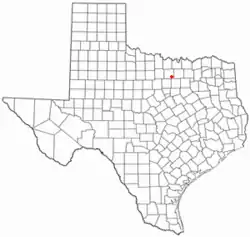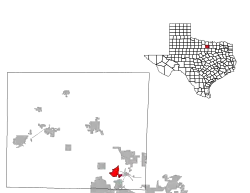Aurora, Texas
Aurora is a city[4] in Wise County, Texas, United States. The population was 1,390 in 2020.[5]
Aurora, Texas | |
|---|---|
 Location of Aurora, Texas | |
 | |
| Coordinates: 33°3′21″N 97°30′35″W | |
| Country | United States |
| State | Texas |
| County | Wise |
| Area | |
| • Total | 3.72 sq mi (9.64 km2) |
| • Land | 3.72 sq mi (9.64 km2) |
| • Water | 0.00 sq mi (0.00 km2) |
| Elevation | 817 ft (249 m) |
| Population (2020) | |
| • Total | 1,390 |
| • Density | 370/sq mi (140/km2) |
| Time zone | UTC-6 (Central (CST)) |
| • Summer (DST) | UTC-5 (CDT) |
| ZIP code | 76078 |
| Area code | 817 |
| FIPS code | 48-04672[2] |
| GNIS feature ID | 1329842[3] |
| Website | http://www.auroratexas.gov |
Geography
Aurora is located at 33°3′21″N 97°30′35″W (33.055942, –97.509615). According to the United States Census Bureau, the town has a total area of 3.7 square miles (9.6 km2), all land.[6]
Demographics
| Census | Pop. | Note | %± |
|---|---|---|---|
| 1890 | 372 | — | |
| 1980 | 376 | — | |
| 1990 | 623 | 65.7% | |
| 2000 | 853 | 36.9% | |
| 2010 | 1,220 | 43.0% | |
| 2020 | 1,390 | 13.9% | |
| U.S. Decennial Census[7] | |||
| Race | Number | Percentage |
|---|---|---|
| White (NH) | 951 | 68.42% |
| Black or African American (NH) | 10 | 0.72% |
| Native American or Alaska Native (NH) | 15 | 1.08% |
| Asian (NH) | 9 | 0.65% |
| Some Other Race (NH) | 1 | 0.07% |
| Mixed/Multi-Racial (NH) | 78 | 5.61% |
| Hispanic or Latino | 326 | 23.45% |
| Total | 1,390 |
As of the 2020 United States census, there were 1,390 people, 420 households, and 356 families residing in the city.
Education
The Town of Aurora is served by the Northwest Independent School District.
- Seven Hills Elementary (K–5)
- Chisholm Trail Middle School (6–8)
- Northwest High School (9–12)
UFO incident
Aurora is best known for a purported UFO crash in April 1897, and the ongoing legend that the UFO's pilot is supposedly buried in the local cemetery.[10] Although the town has embraced the legend to a point (the city's website mentions the legend),[11] the cemetery association has refused all requests to exhume the alien's purported gravesite.
References
- "2019 U.S. Gazetteer Files". United States Census Bureau. Retrieved August 7, 2020.
- "U.S. Census website". United States Census Bureau. Retrieved January 31, 2008.
- "US Board on Geographic Names". United States Geological Survey. October 25, 2007. Retrieved January 31, 2008.
- Census Bureau status changes Archived August 6, 2010, at the Wayback Machine
- "Explore Census Data". data.census.gov. Retrieved May 21, 2022.
- "US Gazetteer Files 2016-Places-Texas". US Census. Retrieved January 7, 2017.
- "Census of Population and Housing". Census.gov. Retrieved June 4, 2015.
- http://www.census.gov
- "About the Hispanic Population and its Origin". www.census.gov. Retrieved May 18, 2022.
- "A Town in Texas Ponders Mystery of 1897 Spaceman", The New York Times, February 26, 1979, p. A14
- "City of Aurora, Texas". Retrieved October 26, 2020.
Sources
- Robert Wooster: Aurora, Texas from the Handbook of Texas Online
Further reading
- Reed, S. G. (1941) A History of the Texas Railroads, St. Clair, Houston; rpt. (1981) Arno, New York
- WPA Federal Writers' Project (1939) Port Arthur, Anson Jones Press, Houston
- DNAlien, A novel by Jim West (2007).
